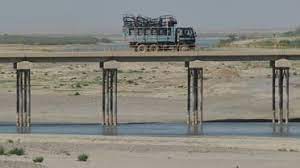TEHRAN (AFP): Iran demanded on Thursday that Afghanistan respect its “water rights”, charging that an upstream river dam there is restricting the flow into a lake that straddles their common border.
Speaking on a visit to drought-parched southeastern Iran, President Ebrahim Raisi said: “I warn the rulers of Afghanistan to immediately give the people of Sistan-Baluchistan their water rights.”
The Helmand River flows from the mountains of the central Afghan province of the same name for more than 1,000 kilometres (600 miles) into Lake Hamoun, which straddles the Afghanistan-Iran border.
Raisi said Afghanistan should allow Iranian experts to visit and evaluate the water situation “straight away”, adding that “the passage of time will not solve the issue”.
Afghanistan has blamed climatic factors for reduced river volumes.
Raisi added that “if our experts confirm the lack of water, we have nothing else to say, otherwise we will not allow the rights of our people to be violated”.
He cautioned that Afghan authorities should take his words “seriously and not complain later”.
Iranian Foreign Minister Hossein Amir-Abdollahian, who was also on a visit to the province, late Wednesday called on Afghan authorities to let the water flow from one of the major dams built on the river.
“Our clear request from the Afghan side is to open the gates of the Kajaki Dam before the time is lost,” he said.
He also made a similar call to his Afghan counterpart Amir Khan Muttaqi during a phone conversation.
“Releasing water from Afghanistan and supplying Iran’s water rights in a practical way is a serious demand of the Islamic Republic of Iran, and this has an impact on relations between the two sides,” he said.
Lake Hamoun used to be one of the world’s largest wetlands, straddling 4,000 square kilometres (1,600 square miles) between Iran and Afghanistan, fed by the Helmand.
But it has since dried up, a trend experts blame on drought and the impact of Afghan dams and water controls.
Iran’s foreign ministry says the country’s share was legally defined in a 1973 agreement between the two countries and demands that Afghanistan uphold the deal.







